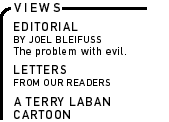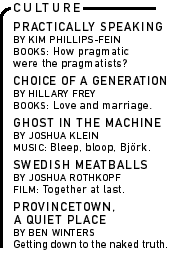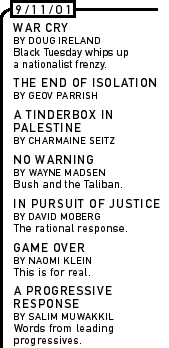|
|

|

|

|
|
|
| |
|
|
|
The slaughter of thousands of innocent people in the attacks on the World Trade Center and the Pentagon gives rise to sharp emotions--numbness, sorrow, horror, despair, fear, anger, revenge and hate. All these feelings are understandable. Not all are noble. In the wake of this atrocity, President George W. Bush is talking war. He defined the enemy stalking our world as an "evil" force. He characterized this war as "a monumental struggle of good versus evil." Rallying the nation against dark forces may accomplish the administration's political objectives––putting a white hat on Bush while priming public opinion for the counterattack, and death of more innocent people, that is sure to follow. But pandering to people's fear of evil does nothing to promote peace. Indeed, it stokes the worst in human nature. In Chicago after the attacks, a Muslim grade school was attacked with a Molotov cocktail; "Kill the Arabs" graffiti was scrawled along a major thoroughfare; more than 300 people waving American flags marched on a mosque in suburban Bridgeview. Yes, people throughout history have done immensely cruel things to their fellow human beings. In some cases, the perpetrators are innately bad seeds--evil, if you will. Yet that is all too simple. Eighteenth-century Americans and English gave smallpox-infected blankets to the Indians. Southern plantation owners traded captive African slaves like animals. Upstanding citizens persecuted German-Americans in World War I and Japanese-Americans in World War II. Members of the U.S. military bombed the people of Vietnam back to the Stone Age. This is not to mention the ongoing imposition by some Western leaders of sanctions against Iraq that have cost perhaps a million lives. Were these historical actors all evil? Or were they, more often than not, normal folks who employed rationalizations to deny the humanity of people who were different, who were "the enemy," or who were conveniently deemed less than human to bolster the power of the established order? One can also play the game of comparing crimes. The day after the bombings, the New York Times' Clyde Haberman took the your-atrocity-is-bigger-than-mine approach. He used the attacks on New York and Washington to justify Israel's policy of targeted killings, asking "Do you get it now?" to those who "damned Israel for taking admittedly harsh measures to keep its citizens alive." In a similar vein, other commentators, mostly on the left, have explained, in some ways excused, the attacks as the understandable reaction of people subjugated to years of persecution. All of these relativist justifications are problematic. They deny the power of human agency and thereby excuse the inexcusable––attacks on the World Trade Center and the Pentagon by Islamic extremists or Israel's state-sponsored assassinations. An action (or reaction) may be understandable--we do get it--but that doesn't make it right. It is no help at all for Bush to simplify the situation as a battle between good and evil. Such a stance, though publicly palatable, reduces things to such a degree that all subtlety and complexity is gone. As Gary Younge observed in the Guardian of London: "Right now America needs a statesman, but wants a cowboy. Bush must steel himself to lead, not allow himself to follow." Alas, this president, apparently incapable of speaking on his own, is not up to the task. When Bush, puppet-like, repeatedly invokes the word "evil," his peaceful intentions, indeed his competence, must be questioned. Too often in modern history the inhuman "enemy" has been deemed
"evil" as a prelude to mass death. Such was the thinking, no doubt,
that went through the heads of the men who plotted the carnage visited
on New York and Washington. But for our elected leaders to respond
with the same kind of mindset can only make this tragic situation
worse.
|





